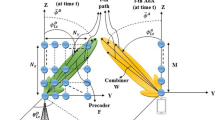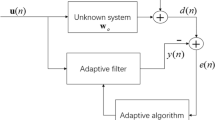Abstract
In the recent time, there have been investigation efforts into time domain channel estimation techniques, exploiting underlying sparseness in OFDM channel, for multiuser-based orthogonal frequency division multiplexing-interleave division multiple access (OFDM-IDMA) systems. This paper developed and proposed a new channel estimation algorithm for the OFDM-IDMA systems. This is called regularized correlated time-averaged-based variable forgetting factor recursive least square (RCTVFF-RLS)-based channel impulse response (CIR) estimator. The performances of the proposed estimator are compared with the performances of some previous estimators in literature with the aid of computer simulation. It is found that the proposed RCTVFF-RLS-based CIR estimator outperforms all the other estimators considered in this paper, and these performances are documented for the system operating under fast and slow fading channel scenarios. However, the proposed estimator exhibits higher computational complexity than the poorest performing estimator considered in this paper. Its computational complexity is in the same neighborhood with some closely performing estimators considered.






Similar content being viewed by others
References
D. Angelossante, G.B. Giannakis, RLS weighted Lasso for adaptive estimation of sparse signals, in Proceedings of IEEE International Conference of Acoustics, Speech, Signal Processing (ICASSP) (2009), pp. 3245–3248
B. Babadi, N. Kalouptsidis, V. Tarokh, SPARLS: the sparse RLS algorithm. IEEE Trans. Signal Process. 58(8), 4013–4025 (2010)
Y. Cai, R.C. de Lamare, Low-complexity variable forgetting factor mechanism for RLS algorithms in interference mitigation applications, in Proceedings of International Symposium on Wireless Communication systems (ISWCS) (2012), pp. 471–475
Z. Cheng, D. Dahlhaus, Time versus frequency domain channel estimation for OFDM systems with antenna arrays, in Proceedings of 6th International Conference on Signal Processing, Zurich, Switzerland, vol. 2 (2002) pp. 1340–1343
E. M. Eksioglu, RLS adaptive Filtering with sparsity regularization, in Proceedings of International Conference on Information Science, Signal Processing and Their Applications (ISSPA) (2010), pp. 550–553
P. Hammarberg, F. Rusek, O. Edfords, Channel estimation algorithms for OFDM-IDMA: complexity and performance. IEEE Trans. Wireless Commun. 11(5), 1722–1732 (2012)
R. Kwong, E. Johnston, A variable step size LMS algorithm. IEEE Trans. Signal Process. 40(7), 1633–1642 (1992)
L. Liu, W.K. Leung, L. Ping, Simple chip-by-chip multiuser detection for CDMA systems, in Proceedings of IEEE Vehicular Technology Conference (VTC-Spring), Korea (2003), pp. 2157–2161
I. Mahafeno, C. Langlais, C. Jego, OFDM-IDMA versus IDMA with ISI cancellation for quasi-static Rayleigh fading multipath channels, in Proceedings of 4th International Symposium on Turbo Codes and Related Topics, Munich, Germany (2006), pp. 1–6
A.F. Molisch, Ultrawideband propagation channels—theory, measurement, and modeling. IEEE Trans. Veh. Technol. 54, 1528–1545 (2005)
A. Mukherjee, H.M. Kwon, Multicarrier interleave-division multiple-access systems with adaptive pilot-based user interleavers, in Proceedings of IEEE Vehicular Technology Conference (VTC 2009 Fall) (2009), pp. 1–5
O.O. Oyerinde, S.H. Mneney, Combined channel estimation and adaptive prediction for MC-IDMA systems, in Proceedings of IEEE International Conference on Communications (ICC), Ottawa, Canada (2012), pp. 3766–3770
O.O. Oyerinde, S.H. Mneney, Adaptive algorithms based-time domain iterative channel estimation for MC-IDMA systems, in Proceedings of IEEE 3rd International Conference on Wireless Communication Society, Vehicular Technology, Information Theory and Aerospace and Electronics Systems Technology, New Brunswick, New Jersey (2013), pp. 1–5
O.O. Oyerinde, S.H. Mneney, Regularized adaptive algorithms based-time domain iterative channel estimation for MC-IDMA systems, in Proceedings of IEEE 4th International Conference on Wireless Communication Society, Vehicular Technology, Information Theory and Aerospace and Electronics Systems Technology, Aalborg (2014), pp. 1–5
O.O. Oyerinde, S.H. Mneney, Variable forgetting factor RLS algorithm-based channel estimator for MC-IDMA communication system. Wirel. Person. Commun. J. 83(2), 1373–1386 (2015)
O.O. Oyerinde, S.H. Mneney, Subspace tracking-based decision directed CIR estimator and adaptive CIR prediction. IEEE Trans. Veh. Technol. 61(5), 2097–2107 (2012)
O.O. Oyerinde, S.H. Mneney, Improved soft iterative channel estimation for turbo equalization of time varying frequency selective channels. Wirel. Person. Commun. J. 52(2), 325–340 (2010)
O.O. Oyerinde, Channel Estimation for SISO and MIMO OFDM Communication Systems. PhD Thesis, University of KwaZulu-Natal, Durban (2010)
O.O. Oyerinde, S.H. Mneney, Soft iterative decision directed channel estimation for ofdm systems employing adaptive predictor, in Proceedings of IEEE 1st International Conference on Wireless Communication Society, Vehicular Technology, Information Theory and Aerospace and Electronics Systems Technology (Wireless VITAE’09), Aalborg (2009), pp. 857-861
O.O. Oyerinde, S.H. Mneney, Regularized adaptive algorithms-based CIR predictors for time-varying channels in OFDM systems. IEEE Signal Process. Lett. 18(9), 505–508 (2011)
O.O. Oyerinde, S.H. Mneney, Iterative receiver with soft-input-based-channel estimation for orthogonal frequency division multiplexing–interleave division multiple access system. IET Commun. 8(14), 2445–2457 (2014)
L. Ping, L. Liu, K.Y. Wu, W.K. Leung, A unified approach to multi-user detection and space–time coding with low complexity and nearly optimal performance, in Proceedings of 40th Allerton Conference, Allerton House (2002), pp. 170–179
L. Ping, Q. Guo, J. Tong, The OFDM-IDMA approach to wireless communications. IEEE Wirel. Commun. Syst. 14, 19–24 (2007)
S. Suyama, L. Zhang, H. Suzuki, K. Fukawa, Performance of iterative multiuser detection with channel estimation for MC-IDMA and comparison with chip-interleaved MC-CDMA, in Proceedings of IEEE Global Communication Conference (2008), pp. 1–5
S. Suyama, L. Zhang, H. Suzuki, K. Fukawa, Iterative multiuser detection with soft decision-directed channel estimation for MC-IDMA and performance comparison with chip-interleaved MC-CDMA. IEICE Trans. Commun. E92–B(5), 1495–1503 (2009)
J. Tong, Q. Guo, L. Ping, Analysis and design of OFDM-IDMA systems. Eur. Trans. Telecommun. 19, 561–569 (2008)
J. Tong, Q. Guo, L. Ping, Performance analysis of OFDM-IDMA systems with peak-power limitation, in Proceedings of IEEE International Symposium on Spread Spectrum Techniques and Applications, (Bologna, Italy) (2008), pp. 555–559
P. Wang, J. Xiao, L. Ping, Comparison of orthogonal and non-orthogonal approaches to future wireless cellular systems. IEEE Veh. Technol. Mag. 1, 4–11 (2006)
J. Ylioinas, M. Juntti, Iterative joint detection, decoding and channel estimation in turbo-coded MIMO-OFDM. IEEE Trans. Veh. Technol. 58(4), 1784–1796 (2009)
Z.G. Zhang, S.C. Chan, K.M. Tsui, Low-complexity variable forgetting factor mechanisms for adaptive linearly constrained minimum variance beamforming algorithms. IET Signal Proc. 9(2), 154–165 (2015)
S. Zhou, Y. Li, M. Zhao, X. Xu, J. Wang, Y. Yao, Novel techniques to improve downlink multiple access capacity for B3G. IEEE Commun. Mag. 43, 61–69 (2005)
Acknowledgements
The author will like to acknowledge the financial supports by the National Research Foundation (NRF) of South Africa in terms of both NRF Incentive funds with Grant Number: 96224 and Research Development Grants for Y-Rated Researchers (YRGR) with Grant Number: 105720.
Author information
Authors and Affiliations
Corresponding author
Rights and permissions
About this article
Cite this article
Oyerinde, O.O. Regularized Recursive Least Square-Based Time Domain Iterative Channel Estimation Scheme for OFDM-IDMA Systems. Circuits Syst Signal Process 37, 831–846 (2018). https://doi.org/10.1007/s00034-017-0587-5
Received:
Revised:
Accepted:
Published:
Issue Date:
DOI: https://doi.org/10.1007/s00034-017-0587-5




